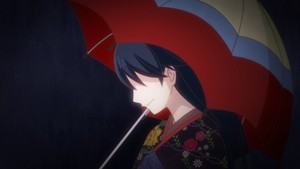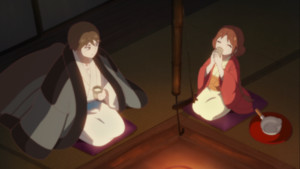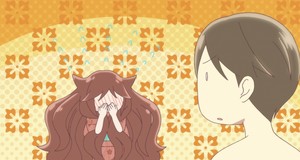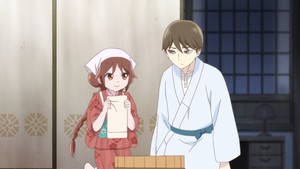The Fall 2021 Preview Guide
Taisho Otome Fairy Tale
How would you rate episode 1 of
Taisho Otome Fairy Tale ?
Community score: 3.6
What is this?

Tamahiko Shima is a young man who lost the use of his right hand in an accident, and now lives in a rural area of Chiba prefecture to take care of his health. One day he meets the naïve and devoted Yuzuki, whom Tamahiko's father bought to be Tamahiko's wife. Through this meeting, the pessimistic and withdrawn Tamahiko begins to change.
Taisho Otome Fairy Tale is based on the manga Taisho Otome Otogi Banashi by Sana Kirioka and streams on Funimation on Fridays.
How was the first episode?
 Richard Eisenbeis
Richard Eisenbeis
Rating:
Coming out of this episode, I feel that a fair amount of cultural context might be needed to enjoy the show—context your average non-Japanese viewer might not have. I mean, it's right there in the title: the word “Taisho” refers to the era between 1912 to 1926 when the emperor of the same name reigned. This is an oft-overlooked time in Japanese history that comes between the modernization and political revolution of the Meiji era and the militaristic first half of the Showa era.
Knowing about the era is important in understanding what is going on in this story. During this time, having a visible disability would have been devastating socially. To say Tamahiko would encounter bullying and discrimination were he to attempt to continue his life as before the accident is a staggering understatement. His very existence in the public view would be considered an embarrassment to his family—hence why they all chose to distance themselves from him and all but pretend that he is dead.
At the same time, however, his father can't actually disown him or make him live in squalor either. The public shame of not taking care of his own family would be even more frowned upon than having a person with a disability in the family. Thus, he has chosen to go for “the out of sight, out of mind” approach: Tamahiko receives a well-maintained house, the money he needs to live comfortably, and a young fiancé/maid to take care of his needs. But of course, Tamahiko sees it all for what it really is: his prison to live in until he dies.
So what does Tamahiko need to save himself from his lonely, survivor's guilt-filled life? Why, an era-appropriate manic pixy dream girl, of course! Yuzuki is sweet, hardworking, humble, and innocent—the perfect woman to mend the soul of a broken man. She's designed to be the ideal traditional Japanese housewife. She does all the chores with a smile on her face and puts her husband's happiness above all other things. And to me, this all makes her bland and boring—more a plot device than a character.
Taisho Otome Fairy Tale is a perfectly watchable anime, but it's just not for me; I don't find the era particularly romantic nor am I invested in Yuzuki and Tamahiko's struggles. While I wish the couple all the luck in finding happiness within their own little corner of the world, this episode gave me little reason to watch work to attain it.
 Nicholas Dupree
Nicholas Dupree
Rating:
The word for this one is “fluffy.” From the art design to the storytelling to even the sound balance, everything about this historical romantic dramedy has the energy of rounded edges and padded corners. There's drama, certainly, and some characters going through some genuinely harsh situations, but it's all delivered with the softest of touches, assuring the audience that this is going to be as gentle and cuddly as possible without literally being a chinchilla.
That approach is one I understand, but not one I'm particularly interested in. I can dig some low-impact slice-of-life comedy, but generally if a show is going to delve into more serious topics like this one does – disability and the attached stigma, arranged marriages as transactions – I generally like them to have more bite. There's some heat to Tamahiko's character, especially when he all but begs for Yuzu to reject him the way he's convinced she wants to, but it's all diffused with very simple – and honestly rather trite – sentiment that makes it all feel insubstantial. Yuzu herself has some glimmers of an interesting character, but largely feels like an immaculate ball of sunshine and healing tailor-made to cure our male lead's woes. Again, I get the appeal, but romances work best when both characters feel like active, fully fleshed-out people in their own right. Yuzu right now feels like a girlfriend fantasy, especially with her promise to “save herself” for Tamahiko once they're legally married, and that's not a dynamic I find at all engaging.
That likely means I won't be hanging around for another episode, since everything else in this premiere plays out strictly to formula. I could see the “sleep together” punchline from a mile away, and the rest of the gags are equally familiar. Maybe it plays better to somebody who hasn't OD'd on shonen romcoms for years beforehand, but when the funniest joke is the sound effect when Tamahiko tosses a pillow offscreen, that's a sign I'm not in tune with the comedy. So if neither rom nor com half works for me, I think it's time to cut my losses. Overall this is a perfectly pleasant experience, but one I'm not interested in repeating.
 James Beckett
James Beckett
Rating:
Let's just get this out of the way up front: Taisho Otome Fairy Tale was never going to be for me, and even though this premiere sports a decent period setting and a couple of chuckle-worthy jokes, I simply do not find the main romantic angle of this story to be appealing at all. The male lead, Tamahiko, is a mopey grouch who has been exiled to Japan's boondocks on account of suffering a debilitating injury, along with having a reprehensible clown for a father. Unfortunately, he has absolutely no chemistry whatsoever with Yuzuki, our female lead, who is indistinguishable from every other chipper and unflappable anime waif from the few decades. It doesn't help that Yuzuki is also poor schoolgirl, no older than fourteen, who has been sold as into indentured servitude as a child bride because her family happened to borrow money from Tamahiko's family.
Now, before anyone starts trying to mouth off in the comments section, no, I'm not about to go on a rant about how “offended” I am, or anything. Cultural and historical differences mean that scenes where Yuzuki is praised for “doing her best” with this bad situation didn't really work for me, sure, but I can get the basic appeal of a setup like this, and despite its potentially troubling subject matter, Taisho Otome Fairy Tale has nothing but pure, childlike, puppy love on its mind. Even the extended gag that sees Tamahiko freaking out over his misunderstanding Yuzuki's request to “sleep with him” is played entirely for gentle, chaste laughs. I don't think I could be offended by this show if I tried.
No, my problem actually runs in the opposite direction, if you'd believe it. I'm going to be thirty in a few short months, and I've been married for six years. While I can appreciate cheesy adolescent romance as much as the next guy, the marriage angle of Taisho Otome Fairy Tale is a bridge too far for me, and it just reminds me of how unbelievably tired I am of how much the anime industry obsessively clings to these stories about sad sack boys and the preposterously patient young girls who dedicate their lives to fixing them. I'm an adult, dammit! I want more romance anime about adults who have actual problems and conflicts that are interesting to watch unfold; adults who share chemistry and desires (along with a functional knowledge of how sex works); adults who feel even vaguely like real people that might actually have existed at some point in time and space.
These are all mostly “me” problems, though, and I totally recognize that. For folks who want a perfectly nice, unambitious take on a historical romance that has two unfortunate kids finding love in a hopeless place, then, yeah, I guess Taisho Otome Fairy Tale is fine. It isn't the kind of romance that I have any interest in, though, and it isn't funny or charming enough to win me over otherwise.
 Rebecca Silverman
Rebecca Silverman
Rating:
I'm sure that this title could have thrown in a few other words to make me want to watch it, but as someone who studies fairy tales, plays otome games, and is fond of the Taisho period, it's hard to think which ones could have been added and still had things make sense. (There is a cat in the episode, so I guess there's another one.) While this isn't strictly a “fairy tale” in the academic sense, it does work with the popular idea of a love story where two beleaguered but deserving people find happiness with each other after suffering their trials, and it is in fact set in Taisho 10 (and 11, since we have New Years pass), so things are off to a promising start. “Otome” seems to be being used more in the sense that our protagonists are innocent (or maidenly, if you will), but again that does work with the story that is being set up.
Tamahiko, our narrator and male lead, is the second of three sons (and one of five children total) and a self-avowed pessimist. Whether that's true or a mask/justification for his depression is up for debate, but either way he's well within his rights to be unhappy: just before the action of the story starts, he's in a car accident that kills his mother and robs him of the use of his dominant hand. Deemed useless by his remaining family – and probably bearing the brunt of their anger and sadness over his mother's death, regardless of whether or not he had anything to do with it – Tamahiko is banished to a remote family estate, with his father just sort of throwing the words, “I guess I'll have to buy you a bride to take care of you” at him in parting. That bride is Yuzuki, purchased from her debt-ridden parents for the astronomical sum (in 1921) of 10,000 yen. Since she's below the legal marrying age of fifteen, we can see that Tamahiko's father isn't overly concerned with niceties for anyone, and he certainly doesn't give a damn about plucking a child out of school and shipping her off to the middle of nowhere to care for his rejected son.
Yuzuki, although sad at having to leave her school and friends, is of the Pollyanna school and is determined to make the best of her situation. She's an interesting mix of childlike and adult in the way she's incredibly competent at taking care of the house (there aren't any servants, which again says a lot about how Tamahiko's father treats him) but has to sing to herself to keep her courage up. She's not hopelessly naïve, but she is innocent, and Tamahiko isn't quite sure what to make of her. It feels as if he's beginning to like her against his will, whereas she is bound and determined to fall for him as part of her determinedly bright outlook on an arguably dark situation.
While this isn't treading any new ground, there's a sort of wholesome charm to it. That goes a long way to making up for hackneyed plots or lines and the simple, at times lackluster artwork. At its heart this is a familiar story about two people coming to care for each other and overcome the obstacles life has seen fit to throw in their way. As long as it keeps that heart warm and beating, this could be a quiet charmer of a show.
discuss this in the forum (250 posts) |
this article has been modified since it was originally posted; see change history
back to The Fall 2021 Preview Guide
Season Preview Guide homepage / archives